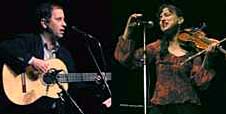Deborah Strauss and Jeff Warschauer ROCK
 I don't know how many times I have seen Deborah Strauss* and Jeff Warschauer. As often as possible, as it happens, and it adds up. Tonight's show at Workmen's Circle in Brookline, though, was the rockingest show I've ever seen them do. It was like a cross between a chassidic revival and a bluegrass show, except for the lack of chassidim and bluegrass.
I don't know how many times I have seen Deborah Strauss* and Jeff Warschauer. As often as possible, as it happens, and it adds up. Tonight's show at Workmen's Circle in Brookline, though, was the rockingest show I've ever seen them do. It was like a cross between a chassidic revival and a bluegrass show, except for the lack of chassidim and bluegrass.
For those not as familiar with their music, Deborah is the incredible fiddler playing alone, in a vacant lot, in Poland, in the middle of the Itzik Perlman "In the Fiddler's House" video. Jeff was the plucked strings genius in the Klezmer Conservatory Band for years and years. (His vocals performances on the most recent KCB CD, A Taste of Paradise, are the standout pieces of the recording.) The two have been touring together for many years. They have a CD available as an import from Germany (irony abounds). It's called "Rejoicing", which is an eponymous title, but also a good description for the CD and tonight's show.
The songs the two sing run a rather wonderful gamut. Most are in Yiddish (translations are provided before the song, or sometimes lined out during the song, as fits best). One, about the new moon (Rosh Hodesh) was in Hebrew—but Hebrew pronounced with an Eastern European accent, not the trendy Israeli accent. Few songs are familiar. A few are current in the former Soviet Union, or come from poets from the former Soviet Union and elsewhere, set to music by Jeff. In one case, Jeff also took the lyrics to the wonderful American spiritual, "The Water is Wide", translated them into Yiddish and reset them as a Yiddish folk melody. Perhaps this is the duo's tribute to the Workmen's Circle chorus which does a lot of spirituals, English and Yiddish.
The songs, on their own, would be a good reason to listen to the two. But the songs come with lots of chassidic niggunim, as well, so there is, as I noted at the beginning, a bit of chassidic revival—if chasidim did revivals of this sort. Then there is that Eastern European/former Soviet Union folk feel. The real pleasure, though, is the playing. In a sense, Strauss and Warschauer have taken the concept of a klezmer set—stringing together lots of tunes into a nice long dance set—into shorter snippets of songs set in an intricate weave of music.
Watching the two just play music, watching them watch each other while playing, watching Jeff switch back and forth between mandolin and guitar, watching their fingers—that's the part that reminds me of bluegrass—the idea of weaving amazing instrumentals and vocals together into a suite of music and words—and yet, retaining the songs. You can still sing along and you will be forced to clap hands and tap feet periodically by the force of the music.
The thing is, as intricate and soulfully skillful as the music is, there is also that rocking intensity. Often by the ends of songs, the musicians are bouncing up and down and the vocals are almost more shout and song. This isn't polite Yiddish in a museum. This is living, Jewish soul music, new and renewing.
Anyway, a good time was had by all and at the end the chairs were all moved to the side of the tiny hall so that Jeff and Deborah could teach some dance, the better that feets could remember the songs next time around.
It was just a wonderful, intimate evening in a wonderful, intimate location. A hartziken dank to both of them.
*Except for Steven Greenman, almost every amazing fiddler in the klezmer world who comes to mind at this late hour is a woman: Alicia Svigals, Deborah, Cookie Segelstein, even Alicia Jo Rabin from Golem and Sophie Solomon of Oi Va Voi. Makes you wonder what music we'd have had if Jascha Heifetz' sister had been allowed on stage.